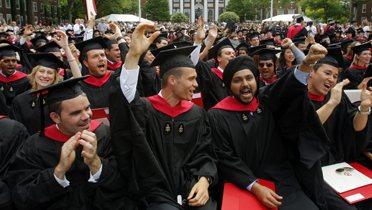In the modern economy, innovation drives growth. From the telegraph to the telephone to the Internet, new technologies increase productivity and allow Americans to prosper. But while innovation has revolutionized the American economy as a whole over the last century, the education sector has benefitted relatively little from these advances.
Although computers and Smartboards are becoming increasingly common in the nation’s classrooms, over the past three decades average math and reading test scores of American seventeen-year-olds have remained largely unchanged. Meanwhile per-pupil spending has almost doubled. This increase in spending partially reflects that schools must compete to hire college-educated teachers in a labor market where well-educated workers command higher and higher salaries, but it also indicates that innovation and increases in productivity have occurred faster and been more effective in the broader economy than in the field of education.
In other words, education has faced a relative innovation deficit. Overall, the United States spends about three percent of its total expenditures on research and development (R&D), with that figure reaching as high as 23 percent in pharmaceuticals (see figure below). In education, however, only 0.2 percent of expenditures are spent on R&D.
Increasing productivity and innovation requires identifying promising approaches, testing those approaches rigorously, and disseminating results. In a forthcoming Hamilton Project discussion paper, “Harnessing Technology to Improve K–12 Education,” Aaron Chatterji of Duke University and Benjamin Jones of Northwestern University put forward a proposal for making the marketplace for education technologies transparent, thus unleashing the powers of innovation in education.
This proposal, and other ideas to improve America’s schools, will be released on September 27th as part of a Hamilton Project event focusing on the value of education, and opportunities to promote attainment and achievement in our K-12 system. U.S. Secretary of Education Arne Duncan will give featured remarks, highlighting recent progress on education reform, the difficult work still ahead, and the need for innovation to help advance reform efforts. Harvard University Professor Roland Fryer, a recent MacArthur Foundation Genius Award Winner; Terry Grier, Superintendent of the Houston Independent School District; Dennis Van Roekel, President of the National Education Association; Karen Cator, Director of the U.S. Department of Education’s Office of Educational Technology, and LearnZillion Founder Eric Westendorf are among the participants in the panel discussions.
Michael Greenstone
is the director of The Hamilton Project and
Adam Looney
is its policy director. For more about the Project, visit
www.hamiltonproject.org
.







Commentary
Innovation Is the Key to Better Education
September 21, 2012